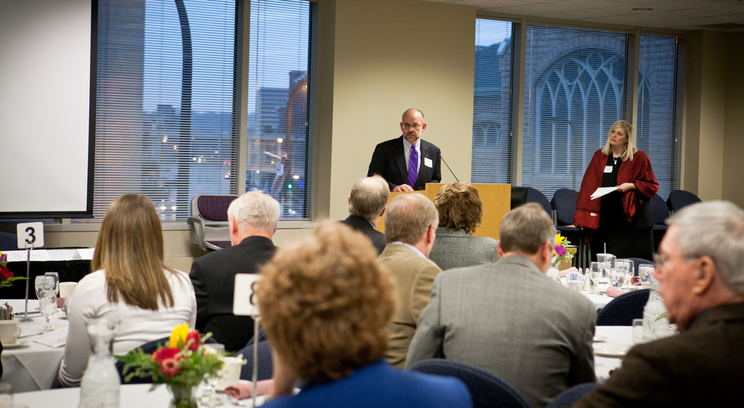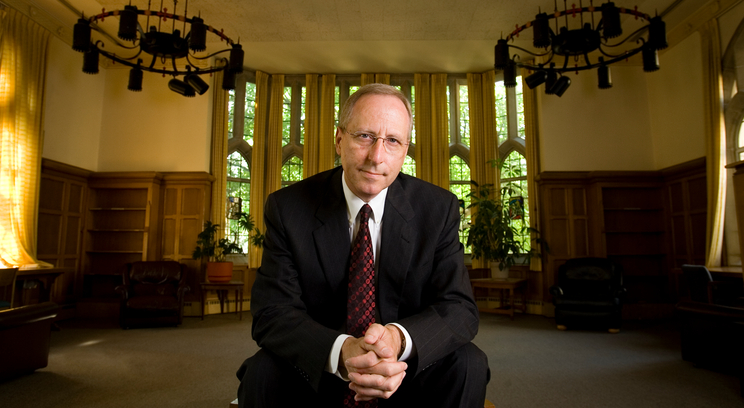A collaboration between the John Ryan Institute for Catholic Social Thought, the Habiger Institute for Catholic Leadership and the Veritas Institute engages questions of faith and work in its annual series, “The Higher Calling of the Entrepreneur.” The collaboration, which began in 2009, was initiated to illuminate the moral challenges confronting contemporary leaders within a variety of institutions. According to Dean Maines, president of the Veritas Institute, “This series uses the experience of executives as a departure point for reflection and conversation on the resources leaders must draw upon to help their organizations respond ethically and effectively to particular moral issues.”
The format includes a guest speaker, a respondent, panel discussion and a moderator. The audience includes local business leaders, UST business and Catholic Studies faculty, and Catholic Studies undergraduate students who have declared business majors. The evening begins with a presentation by the speaker, moves to the responder, and then to conversation over dinner to discuss the presentation and response. Following the dinner conversations, the guest speaker and responder reconvene to entertain comments and questions.
In February, guest speakers included Ed Mosel, former COO of Engineered Products, and Dr. Kyle Smith, president and CEO of Reell Precision Manufacturing Corp. Respondents were Dr. Jeanne Buckeye, associate professor, Ethics and Business Law, Opus College of Business, and Dr. Michael Naughton, director of the John A. Ryan Institute. Both Mosel and Smith were featured in Naughton’s latest book, Leading Wisely in Difficult Times.
Mosel aimed his remarks at the intersection of faith and work and noted that a company must have core values and a culture that reflects those values in order to have an integrated vision. He also spoke of the need to admit failures and imperfections which are always present. “On a daily basis, leaders of organizations are digesting massive amounts of data and making the best decisions with the information available under the pressure of many constraints.” Not every decision is the right one, and wrong decisions need to be addressed openly by corporate leaders. “Open and honest communication and the trust that it builds, is the foundation for learning from past decisions and reshaping future strategy that organizations can believe in.”
Smith’s presentation took an active look at a policy change in accounts payable at Reell that tested their core values and brought some anxiety amongst their employees. Executives at Reell, including Smith, decided to move from a 30-day receipt policy to a longer period that reflected general business practices. Smith explained the policy in terms of “confusing form with principle.” Reell was committed to paying its vendors on time – a core principle of its values. But the form had changed in the extended length of time in which it paid. Smith remarked of the experience, “We needed to be unwavering in our core values (principles) but realized that the form may change over time. If you don’t distinguish between form and principle, trust may erode, or employees may believe the core principles really don’t matter.”
The event was attended by students and their mentors in the Habiger Professional Leadership program, which pairs business/Catholic Studies students with local business men and women. Chris DuFresne, Catholic Studies board member and executive at Target Corp., felt that the presentations were remarkable in their ability to integrate business practices with a faith perspective. “The discussion from a ‘practioner’s’ point of view, balanced with an academic point of view, provided for a very thought-provoking discussion.” His mentee, Mike Truso, was encouraged by what he heard. “As a senior about to graduate and enter full time into the work force, it was encouraging to be among so many business professionals who are eager to discuss the integration of faith and work and be leaders in their respective institutions to bring that integration to fruition.”
To hear the lectures, visit the Higher Calling website: https://www.stthomas.edu/cathstudies/leadership/professional/highercalling.html
Read more from Perspectives







